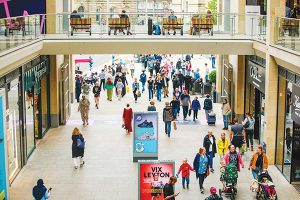Bloomberg
The highest increase in consumer debt in over 18 years appears to have helped the UK’s retail sector, as Britons borrow to buy products ranging from high-ticket electronic items to basics such as milk.
A borrowing binge has taken off in the UK with credit card activity rising at its fastest pace since March 2004, an increasing number of pensioners using buy-now-pay-later and retailers reporting that many shoppers are turning to finance. Meanwhile, one British pawnbroker’s loans have struck a record high.
While the overall volume of retail sales slid 1% in December, many stores enjoyed a stronger Christmas than had been expected and retailers’ shares rebounded in recent weeks after falling sharply for most of 2022. A string of trading updates provided some cheer in a country that is facing a severe cost-of-living crisis with inflation near 40-year highs and recessionary fears swirling.
But the widespread use of credit means there could yet be more pain to come for the sector if customers struggle to service their debt or are forced to constrain their spending at a later stage.
“It is normal for credit to rise at this point in the economic cycle, but we don’t expect it to last,†said Investec economist Philip Shaw. “Once people start hitting their credit card limits and run into difficulties in servicing their debt, this will run out of steam.â€
Next Plc raised its profit forecast thanks to a rise in sales, while Marks & Spencer Group Plc’s clothing and home division reached its highest market share in seven years. Grocers also benefited with Tesco Plc, Aldi, Lidl and Ocado all setting records for sales in the approach to Christmas and J Sainsbury Plc guided to the upper side of its profit forecast.
However, a lot of Britons’ spending appears to be credit-fuelled. Bank of England data shows that credit card lending to individuals jumped by £1.19 billion ($1.47 billion) in November — the highest monthly increase since March 2004. Data for December comes out in February.
Credit cards aren’t the only product seeing a spike. UK electronics retailer Currys Plc reported record credit adoption in the 10 weeks to January with its “point-of-sale financing†— loans that allow customers to split payments over a year or longer — accounting for more than 18% of sales. Almost 2 million Currys customers are currently using credit, up from about 1.6 million a year ago.
It isn’t just big-ticket items such as electronics that benefited from the surge in spending. Data from fintech business Revolut suggested that supermarket spending was up 7.8% in December.
Sales at budget supermarket Iceland grew 14% in the four weeks to Christmas and customer numbers grew by 35% as shoppers sought to save money amid the cost-of-living crisis. More than 10,000 customers used Iceland’s micro loans in December, which let shoppers pay for food in the
installments.
While results from companies in the burgeoning buy-now-pay-later sector, which allows customers to split online purchase payments into three or more instalments, are yet to be released, surveys suggest this form of financing is gaining mainstream popularity.
 The Gulf Time Newspaper One of the finest business newspapers in the UAE brought to you by our professional writers and editors.
The Gulf Time Newspaper One of the finest business newspapers in the UAE brought to you by our professional writers and editors.
